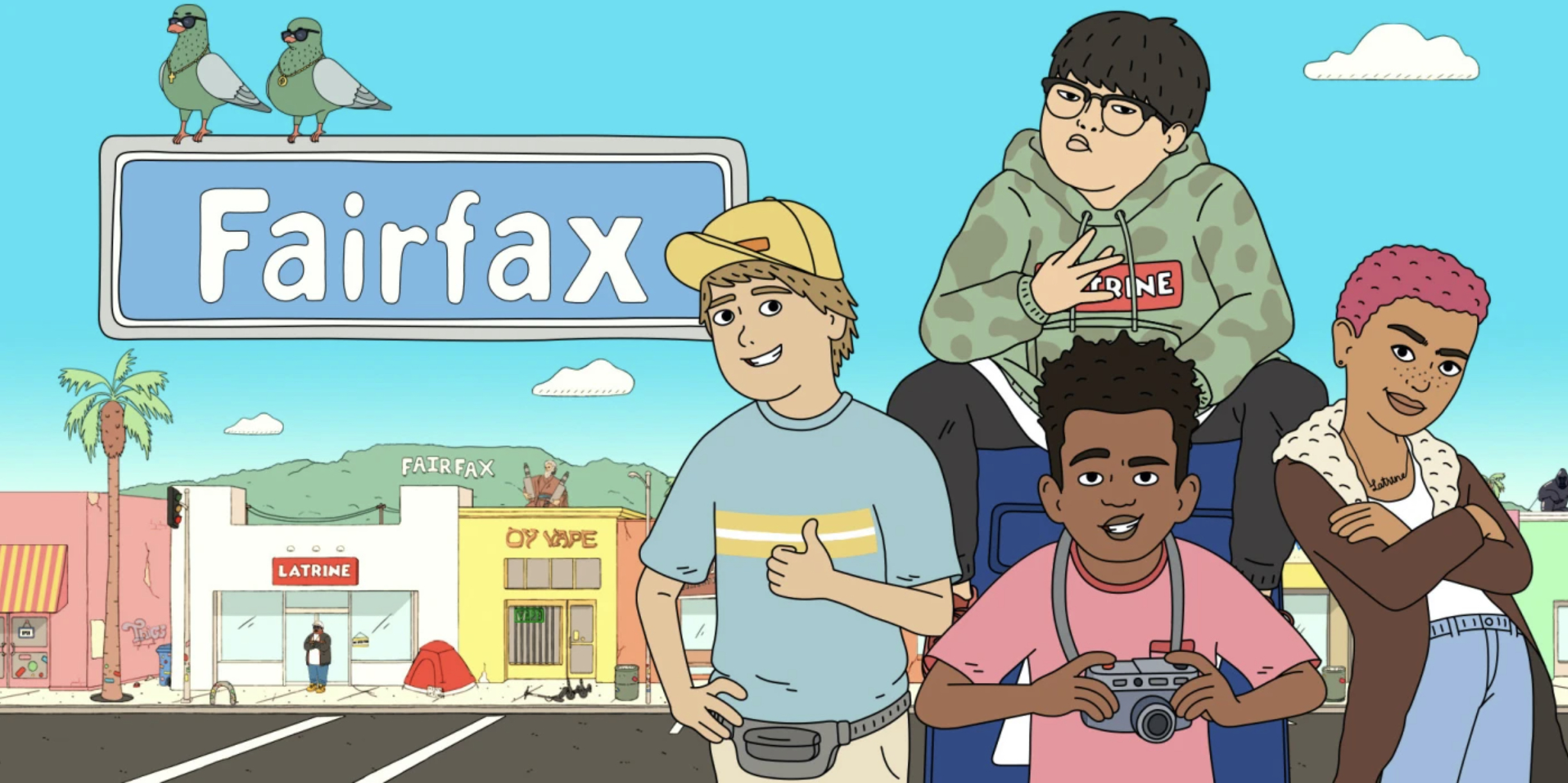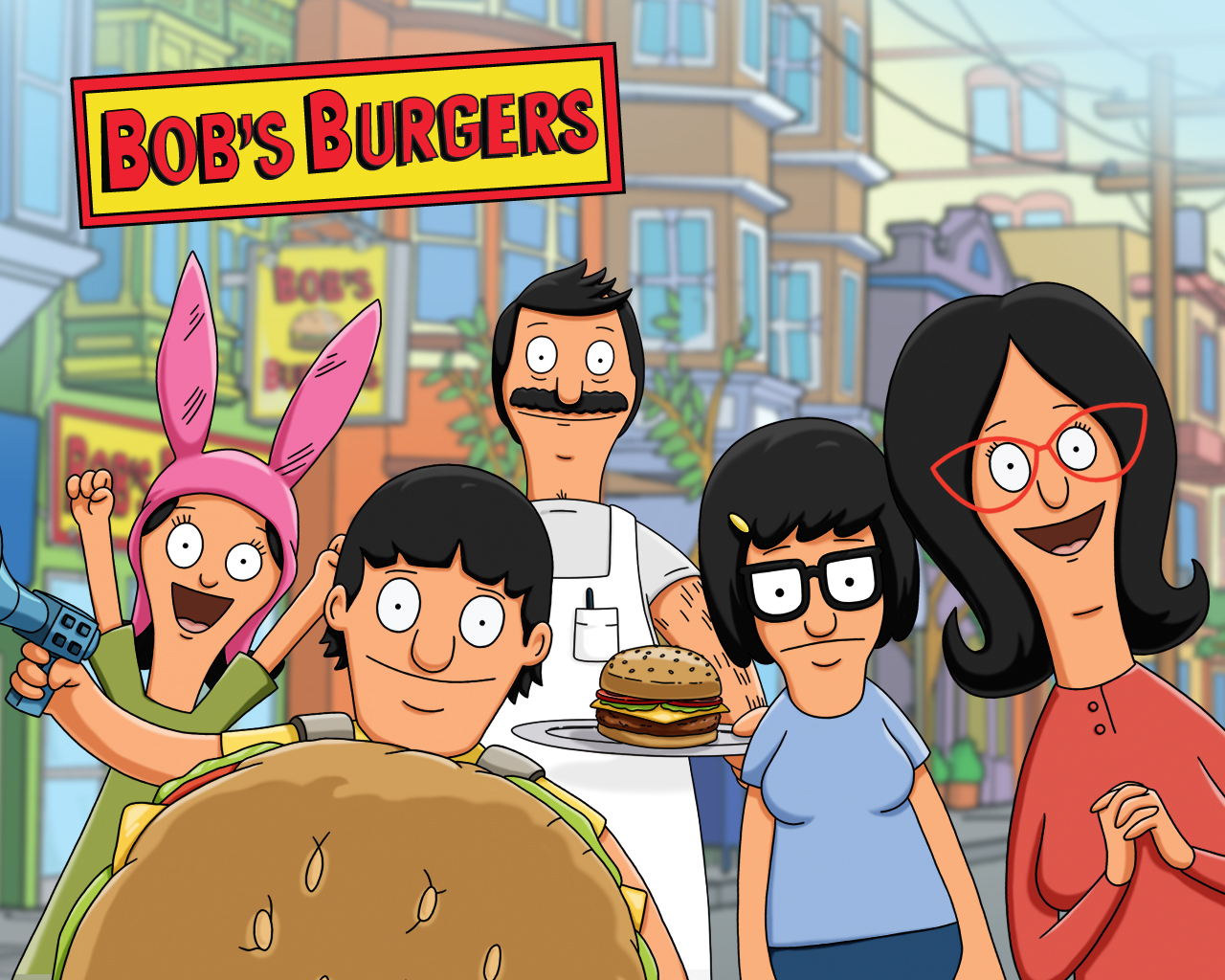Season Review: Fairfax Season One
Overview:
The world can be a cruel, vicious place, especially when every byte of data is consumed through the filter of social media’s grand equalizer. Followers, fame, and branded sponsorships may seem like pipe dreams to most of the starry-eyed souls who roam the streets of Los Angeles’ Fairfax Avenue, but for the impressionable middle schoolers it’s the only life that they know. Fueled by youth and an echo chamber of confidence, the members of Gang Gang–Truman, Derica, Benny, and their newest ally, Dale–are ready to take the world by storm, one like and retweet at a time.
Our Take:
The Internet and social media have become worthless black holes of disillusionment and ego, and if you don’t believe that then just click around the web half-a-dozen times for a sobering reality check. It’s accordingly become low-hanging fruit to blast these tools that have become the calling cards of millennials and there is no lack of series that critically lean into this angle and the demographic that it feeds upon. Fairfax doesn’t go so far as to praise social media and influencer culture as society’s salve, but it does reflect the strange beauty of it all and why it’s a necessary evil in modern society. Fairfax filters its fascination and hostility for the changing state of the world through characters who should be deplorable, but are too damn engaging and entertaining to hate. Fairfax understands how to properly build ire in its audience and get their bile to rise, but it’s through such an accurate, provoking perspective that makes it incredibly easy for audiences to smash that subscribe button and jump through Fairfax’s many social media hoops for more absurd content.
Created by Aaron Buchsbaum, Matt Hausfater, and Teddy Riley, Fairfax almost feels like the perfect stylistic synthesis between Lucas Bros. Moving Co. and Ugly Americans, only this world is filled with millennial influencers and hypebeasts rather than actual beasts. In a projection of reality that’s heightened, but not by that much, Fairfax is set on the titular strip of Los Angeles real estate where brand recognition and clout dreams are the ultimate forms of validation. This hyperaware view of the world isn’t unexplored in animation, but Fairfax finds the perfect exaggerated tone where the lawlessness of social media bleeds into real life. Fairfax depicts the type of world where schools hold assemblies for when a student becomes verified on Twitter and their eSports teams take precedence over the anniversary of a student’s passing.
Fairfax has no shortage of “social media emergencies,” which in less competent hands could become repetitive, but the series never allows itself a chance to slow down or consider that all of this virtual grandstanding shouldn’t be top tier events in the community. It’s so crucial in a series like this that Fairfax immediately finds its groove and then only continues to turn things up. It doesn’t need to take several episodes to find its footing or for the characters to gel together.
What’s also crucial is that Fairfax tows a fine line where there’s clear disdain for this influencer-focused way of life, but there’s still genuine humanity to these characters. If Fairfax was purely dunking on this generation for its entire runtime it would be insufferable, but it taps into the proper emotional catharsis wherein there’s still a clear amount of love for these characters and their universe, even if most of their objectives are criticized and embellished in a tongue-in-cheek fashion. Going too far in either extreme would lead to a much weaker show, but Fairfax will connect for individuals who both subscribe to this type of lifestyle, as well as those that can’t stand it.
At the center of Fairfax are the members of Gang Gang, a Weekenders-esque group of content creators and clout machines that attempt to rein in the community’s constant theatrics. Fairfax newcomer, Dale Rubin (Skyler Gisondo), is the audience surrogate of sorts who is often mystified by Fairfax’s very public ways of life. As the resident outsider, Dale often needs Fairfax’s customs broken down for him, but it remains entertaining and not some expository concession. Dale is a masterpiece of a “non-character” who constantly exudes wholesome vibes. It’s an energy very similar to other intentionally beige protagonists like Ugly Americans’ Mark Lilly or The Goode Family’s Gerald Goode, but Fairfax makes Dale work and positions his oblivious normalcy as a superpower of sorts in Fairfax’s media savvy world. Dale is often a blank slate, which allows the rest of Gang Gang–film nerd Truman (Jaboukie Young-White), misguided activist Derica (Kiersey Clemons), and trend-chasing Benny (Peter S. Kim)–to properly pop.
While very benign elements in the series, Fairfax’s talking pigeon duo are entertaining, yet almost feel like a frightened impulse to better sell the show and its “weirdness.” These pigeons are never too distracting and they do function as a decent marketing gimmick, but they’re not elements that Fairfax actually needs. At the same time, this flashy gimmick’s existence does fit with the show’s influencer culture and highly-branded and manipulative subject matter. Verified status, prank lords, self-branding, parties where guests need a designated quota of followers are all normal hurdles in the world of Fairfax, which is always strongest whenever it’s able to shine a light on how a social media-dominated world perpetually forces students to perform stunts.
Some of these jokes are absolutely fantastic, like the music festival Chernobylfest, which celebrates pollution and radiation (and hosted by “littercore” legends, Yung Polluter and the Litter Gang, natch), an episode that gloriously riffs on Free Willy and The Hot Ones talk show, or the presentation of sequences through the lens of a Twitch stream where comments dominate the screen and overload it with content. Even the celebrities that Fairfax chooses to target and lampoon, like Joaquin Phoenix and Denis Villeneuve, feel relevant, not dated.
Fairfax is able to build to wilder events like how a targeted S1m0ne style catfish experiment can function as clever commentary on the increasingly elaborate length that companies will go to gain user data. Stories like this are not only incredibly of the moment, but they’re the types of plots that largely haven’t been explored in television series before, or at the least are ideas that haven’t been done to exhaustion. It helps make each offering of Fairfax feel unique and unpredictable. Every episode is original and even if they don’t always connect with the audience there’s still something to be said for that. Fairfax is excellent with its realistic portrayal of how identities get constructed through social media and that too many influencers can poison an individual and leave them without a personality, where just an amalgamation of pop culture references and products remains.
On an aesthetic level, there’s such a liveliness to the animation in Fairfax, which features character designs from somehoodlum and pizzaslime. Every frame is bursting with color, but there’s also such visual excitement where chaos dominates the screen to complement the show’s themes, but never to an overwhelming degree. During a time where there is such a homogenized and cookie cutter look to animated series, Fairfax looks different and stands out, which is so important. The series also explores more experimental impulses and color palette deviations, where it’s allowed to flourish, not shrink. Fairfax prides itself in its creativity, just like the influencers that the series gravitates towards. All of this is enhanced with the perfect soundtrack that uses popular music to enhance the absurdity on screen.
Fairfax understands its assignment, but there’s a little ambivalence when it comes to the program’s ideal target audience. Fairfax is definitely geared towards a young adult demographic of older millennials. The series doesn’t shy away from mature subject matter, but there’s an innocence to the Gang Gang and it’s totally possible to picture an audience of thirteen year-olds enjoying the antics of the Gang Gang. It’s not easy to create a series that connects with a younger crowd, but still appeals to adults in a way that doesn’t feel pandering. Fairfax achieves this difficult balance.
Fairfax does become a bit more of an anomaly on Amazon. Prime doesn’t have a huge roster of animated programming and the ones that it does are incredibly adult in nature, like Invincible and Undone, which don’t represent the wild, lighthearted comedic energy that’s present in Fairfax. This isn’t a problem, but it’s just more of a testament towards the strength of Fairfax and how it deserves the opportunity to thrive and gain complementary programming that accentuates its existence rather than turns it into one of the streaming service’s many buried gems that quietly disappears. There’s a staggeringly beautiful moment towards the end of these first eight episodes that intercuts a cello performance with a Charlie’s Angels inspired action sequence that’s set atop the roof of a moving truck that I couldn’t stop smiling at. It’s an epic culmination of everything that the series trades in and by the end of the season the series has really built to an effortless, confident place with its characters, storytelling, and the risks that it’s willing to take.
Fairfax never builds itself up to be essential, prestige animated programming, which helps this playful Amazon Prime series become one of the bigger surprises of the season. Fairfax quickly finds its rhythm and never loses it as it creates incredibly comfortable and confident comedy, characters, and a community. Fairfax is an absolute delight that deserves an even longer leash to explore its weird and wilder tendencies. This first season establishes a strong foundation for the series and it’s very easy to picture it turning out a long run of episodes with a successful future ahead. Fairfax is destined for a verified future full of millions of followers and a baller ratio to be envious about.
This review is based on all eight episodes of ‘Fairfax’s’ first season























"There are also other characters that come and go (also owned by the Warner Bros. Discovery conglomerate media company)."
Huh. Is that just referring to other characters from the show itself, or is this implying that the new season is going to have cameos from other WBD IPs